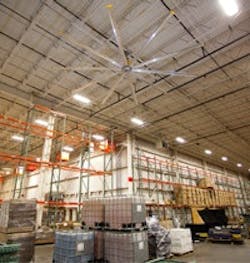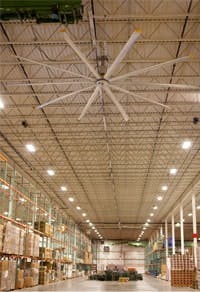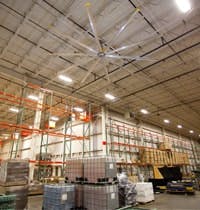A tale of 2 industrial plants
A facility that maximizes both mechanical and human effectiveness needs to address occupant comfort. Poor climate control can negatively affect both worker productivity and morale. While HVAC systems carry the majority of the responsibility for employee comfort at most facilities, large-diameter, low-speed fans made a significant difference at plants in Wisconsin and Tennessee.
No need for heaters
|
View more fan content on PlantServices.com |
Located in Superior, Wisconsin, the 300 employees at the 45,000-sq-ft Amsoil (www.amsoil.com) synthetic lubricant plant are well-versed in cold working conditions, especially with winters averaging 10 °F to 15 °F. Within the manufacturing plant, temperatures at the plant floor remained at 45 °F to 50 °F, while the temperature under the roof deck averaged 75 °F to 80 °F. After installing eight fans from Big Ass Fans (www.bigassfans.com), including hanging 14- and 24-ft PowerfoilX fans from the 30-ft ceiling, the vertical temperature differential was brought down to less than 1 °F.
Two 24-ft diameter fans circulate massive amounts of air at Amsoil to keep employees cool in the summer and reduce heating costs in the winter.
After installing units from Big Ass Fans, typical winter thermostat readings now average 62 °F to 64 °F, says Plant Manager Jack Swonger. The fans “knocked our gas consumption for heating down about 35% right from the get-go,” he says. With ambient temperatures more consistent, his employees are more comfortable, and “the heaters hardly ever kick on anymore,” says Swonger.
Large-diameter fans are capable of destratifying the air, reducing energy consumption by as much as 30%, says Christian Taber, senior applications engineer and LEED AP for Big Ass Fans. Instead of reversing the fan, it’s simply slowed to 15% to 25% of its maximum operating speed, so no draft is felt. With proper air circulation, warm air is pulled from the ceiling and brought down to the plant floor before escaping through the walls and roof. “Even though the thermostat setpoint remains the same in the winter, the heating system doesn’t have to work as hard to maintain the given setpoint,” explains Taber. “By reducing the amount of heat escaping through the roof, it’s similar to turning the thermostat down 5 to 7°.”
Machinery heat
During the cold Tennessee winters, mechanical- and structural-grade steel manufacturer Lock Joint Tube (LJT, www.ljtube.com) in Chattanooga, Tennessee, saw its energy bills skyrocket in ongoing efforts to keep employees comfortable. The 235,000-sq-ft, 40-foot-high facility became impossible to heat using the existing heating system. Drastic temperature differences between the floor and ceiling and general employee discomfort provided the impetus for change. During a two-year period, starting in 2005, LJT installed 12 20-ft-diameter units from Big Ass Fans throughout its warehouse. Circulating the heat generated by the production machinery constantly in use, LJT was able to entirely eliminate the need for additional heating energy. “I haven’t paid a heating bill in six years,” garnering a $4,000/month savings, says Mike Donnelly, vice president and general manager.
The air provided moves over and around obstructions to reach as far as 20,000 sq ft.
Although fans don’t reduce the air temperature in a space, the perceived cooling effect can make a person feel as much as 8 °F cooler, explains Taber. For LJT, not only was comfort greatly enhanced, but an added benefit of the fans was the reduction in condensation attributable to the increased airflow, explains Donnelly. “Because we’re now able to move air through the plant, we can prevent our steel tubes from rusting,” he says. “Our fans play a big role in reducing condensation, and we no longer have smoke problems from the machinery inside the plant. In every aspect, it’s a much more comfortable space.”
With the success of Donnelly’s fan installation in his Chattanooga facility, he has since incorporated large-diameter, low-speed fans in numerous other facilities, both retrofits and new construction, to help with heating, cooling and condensation issues. “I put a fan every 100 ft, regardless of what I am doing in the building,” he says. Foregoing the need for heating elements, LJT has brought their energy management under control.
How it works
One large-diameter fan is capable of covering an area as large as 30,000 sq ft, explains BAF’s Taber. In warmer months, large-diameter fans improve personal comfort with an evaporative cooling effect. In the winter, they help destratify the air to produce a uniform temperature throughout. Stratification occurs because hot air is less dense than cold air. The air that comes out of a heating system, or in some manufacturing facilities the equipment itself produces heat, is approximately 5% to 7% lighter than the air in the space, collecting at the ceiling. This results in a significant vertical temperature difference from 5 °F to 30 °F.


